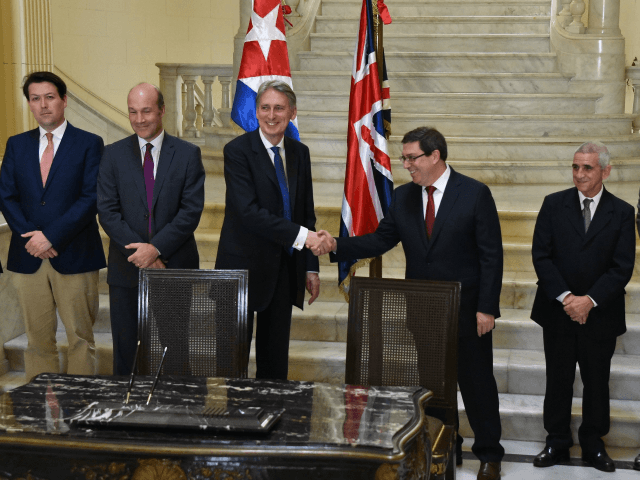Britain’s foreign secretary met Cuban officials on the first such visit to the island since 1959, for talks on boosting trade and tourism ties with the communist state.
Philip Hammond’s trip comes a month after US President Barack Obama’s historic visit to the Caribbean nation, which is opening up to warmer ties with its old Cold War rivals.
Hammond told reporters in Havana that he was “the first UK foreign secretary to visit Cuba since the revolution” that brought Fidel Castro to power in 1959.
His visit also follows meetings in recent months between Cuba’s President Raul Castro and other top officials and leaders from the European Union.
Hammond met with his Cuban counterpart Bruno Rodriguez and signed several cooperation agreements with other communist government officials.
They covered areas such as financial services, energy, culture and education, he said.
Hammond said he wanted “enhanced bilateral cooperation underpinned by increased trade, increased investment and more tourists coming to Cuba” from Britain.
Britain was the second-biggest source of foreign tourists to Cuba last year after Canada, with 160,000 Britons making the trip, he said.
His ministry said earlier that he would sign a “bilateral agreement restructuring Cuba’s debt to the UK,” but Hammond did not comment about that during his news conference later in Havana.
He also met with representatives from Cuban civil society and the British business community in Havana, the Foreign Office said.
– Cuba and Europe –
Raul Castro met with French President Francois Hollande on a visit to Paris in February.
In March, European Union foreign policy chief Federica Mogherini became the highest-ranking EU official ever to visit Cuba when she travelled to Havana.
She signed a deal to normalize relations with Cuba, including an agreement on human rights.
Hammond’s office said he, too, would broach the sensitive topics of human rights and social and economic reform in Cuba.
Cuba’s leaders have rejected criticism of their human rights record by the United States and Europe, warning that they will not tolerate meddling in their country’s internal affairs.
Britain in 2010 launched a drive to strengthen its ties with Latin America and also backs the EU agreement with Cuba.
“The UK is a strong supporter… of the development of European Union-Cuba relations,” Hammond said in Havana.
Britain wants to “strengthen a bilateral dialogue where we’re able to raise issues of concern to both sides in the spirit of free and open discussions,” he added.
“Britain and Cuba have outlooks on the world and systems of government that are very different,” Hammond said in a statement ahead of his arrival.
“But as Cuba enters a period of significant social and economic change, I am looking forward to demonstrating to the Cuban government and people that the UK is keen to forge new links across the Atlantic.”
– British exports to Cuba –
British direct exports to Cuba — mostly dairy, pharmaceuticals and machinery — increased by nearly a third last year to the equivalent of about $36 million, Hammond said.
Indirect trade via companies based in third countries made the total even bigger, the British embassy in Havana added.
The growth in trade coincided with the historic rapprochement between Cuba and the United States after 50 years of enmity stemming back to the Cold War.
Although the two countries restored diplomatic ties last year, the US trade embargo on Cuba dating to the 1960s remains in place.



COMMENTS
Please let us know if you're having issues with commenting.